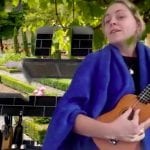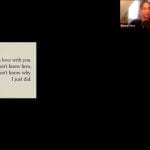Arts management does not exist in a vacuum, and neither do arts organisations. The arts are a petri dish where culture grows and develops in response to wider social, political and economic contexts and changes in society. It is inevitable then, that much like the arts we manage, the way we teach has also changed in response to Covid-19. Some of these changes will hopefully be temporary, but others will hopefully stay. The ability to engage with professionals from around the world, and with students from every corner of the world through a computer has provided radical new ways of working, but also radical new modes of practice. Central to our model of arts management teaching is a close relationship with art, artists, and arts organisations. That has been no different this year, and in many ways has been more exciting, dynamic, and future focused than before.
Building a community
As a team we were quick to isolate the core components of our teaching ethos – student centred design, a safe and supportive learning environment, and access to world leading thinkers. Indeed it was this ethos that helped us to shape our first approach at creating a space that could replicate our learning community in an online environment. Induction week is an exciting time for staff and students, it’s a chance to meet new people, experience new things, and get a taste for what is to come. Working with Exit Productions, a UK based theatre company, we commissioned a performance of their successful interactive, online show ‘Jury Duty’ for our new students. The show which lasted for just under two hours puts the audience in the role of Juror, together they must review the evidence, meet the defendant, and ultimately decide if they committed the crime. This provided students with the chance to get to know each other, have fun, and to think about online performance, and the role of the audience in ‘creating’ performance.
This same group of students were then able to reverse roles, and develop their own online performances. Working with Adam Marple, Artistic Director of The Theatre of Others, students devised a set of five performances inspired by Shakespeare’s “Romeo and Juliet”. The results were inspiring, and showed how arts managers can learn through the practices of the arts that they manage. You can see some examples of this work below.








(First row: L-R: Tala, Alex, George and Ines. Second row: L-R: Ida, Silvia, Adam, Emma)
Insights from the arts
This year we have worked with our brilliant network of creative professionals to bring their insights to students in new ways, but we have also used this moment to develop the ways in which we work with visiting professionals. This year we have had visiting professionals from The Design Museum, Barbican, Royal Academy, Morris Hargreaves McIntyre, British Museum, Charlotte Spencer Projects, Royal Albert Hall, Deptford X, Tramshed, Laura Callender PR, Arts Council England, Tate, Whitechapel Gallery, Migration Museum, Southbank Centre, Mall Galleries, Wigmore Hall, Greenwich and Docklands International Festival, Bush Theatre, Akram Khan.
Typically second year students undertake an in depth case study by being embedded in an arts organisations, this year we moved to online mentor sessions. These sessions provided students with the opportunity to work closely with visiting professionals, to have honest dialogue, and develop their confidence in having professional conversations. Our mentors were drawn from SPACE, Horniman Museum, Wired PR, Young Arts Fundraisers.
International perspectives
We have also had the opportunity to receive contributions that add an international perspective, for example students on the “Fundraising in the Arts Module” were able to meet with staff from The Whitney Museum of American Art, and The Morgan Library in New York to gain insights into the American Model of Fundraising.
This year we launched a new optional module called ‘The State of Hip Hop’ which brought together scholars from Goldsmiths and beyond, with Faculty and students from Temple University, Philadelphia joining some of the sessions, this new virtual collaboration provided an opportunity for international perspectives on this module. A number of external academics also contributed to this module including: Dr Greg DeCuir Jr, Curator of the Black Light Retrospective, Dr Monique Charles Grime independent scholar; Dr Gabriel Dattatreyan, Department of Anthropology at Goldsmiths and Dr Jaspal Singh, University of Hong Kong.
For a number of years now we have worked with LASALLE College of Arts, in Singapore. In 2019 we sent a small group of students to Singapore to work with students from LASALLE to develop a joint research project which sought to challenge ‘the status quo as the role of arts management’. Students with the support of Faculty developed a series of case studies which demonstrated innovative practice in the UK and London. This year this partnership was developed virtually, and future collaborations are planned. This partnership is funded through the Goldsmiths-LASALLE Partnership Innovation Fund (PIF)
Students in their final year
In the final year of BA Arts Management students are supported to develop their own professional and academic interests, and this year has been no different. We have been inspired by the new ways that students see the world, the solutions they offer and the practice they develop. In terms of dissertations we have students researching environmental sustainability at music festivals, the impact of Covid on music venues in London, emerging business models in the commercial art market, and the social benefits of arts facilitation on newly arrived refugees to the UK. Increasingly students are engaging with digital platforms and digital culture, with focus groups and interviews via zoom, and digital ethnography methods being used to develop new ways of thinking about how we experience culture online.
Students have also been running their own events and raised over £1000 from Kickstarter to run online projects. Identities Theatre explore the complexities of cultural identity through the medium of theatre and Express-impress have created an online arts platform to engage young people in social and political activity. One group of students has teamed up with Design students at Goldsmiths to create the online exhibition I-N-S-I-D-E which focuses on developing creativity and having fun whilst stuck inside. These events and projects will all be delivered by the end of May.
What next?
We are excited to build on our successes this year, and to help future proof our students for this new world. In Autumn 2021 we launch a new core module ‘Digital Culture, Digital Literacies’ which will provide first year students with the opportunity to critically engage with digital technologies, and develop the skills needed to collaborate digitally with colleagues around the world. This module examines platforms, and information hierarchies from a theoretical perspective, and provides students with the skills and knowledge to not only use these technologies, but also to examine the intended and unintended consequences of creating culture online. What we have learnt this year is that teaching arts management is much like arts management itself, always shifting, always changing, exciting, challenging and dynamic. That is something that is unlikely to change, and as a team that is something we are excited about.
Dr Oonagh Murphy is a Lecturer in Arts Management.
You can find out more about BA Arts Management, academic staff in ICCE and our BA Arts Management Alumni.